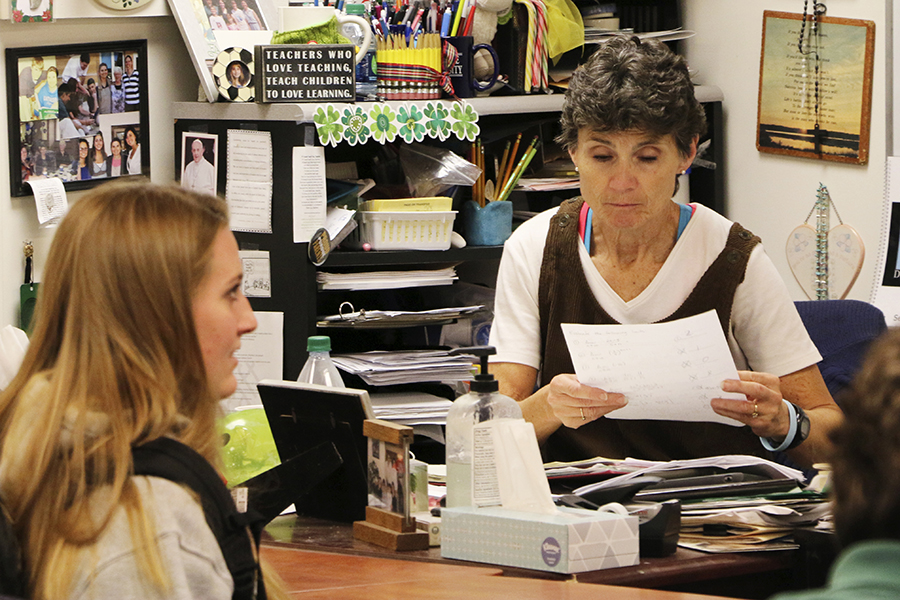Seniors with A’s can be exempted from some finals
Exemption policy in place since 1998
Math teacher Mrs. Lisa Ford reminds students that the deadline to register for this year’s Math League is Sept. 9.
Finally, the school year is almost over, and for many seniors, that finality includes not taking finals.
According to Vice Principal for Academics Mr. Dennis Thomas, the exemption policy for seniors has been in place at least since he came to the school in 1998.
He said that he would imagine that the original discussion, with which he would agree, is that an A reflects knowledge of the course material, and therefore there is no need for the senior to take the exam. “There is (a sense of) comfort from the teacher in the students that they have displayed a mastery in the content skills of the subject matter,” Thomas said.
One teacher who permits a student to opt out of the final is math teacher Mrs. Lisa Ford.
According to Ford, although she said she personally prefers to allow seniors to skip a final, but if the other teacher feels strongly about seniors taking a final, then she will require them to take it. “I find it motivational for (seniors) to work in the second semester,” Ford said.
For seniors such as Emily Flanagan, who will have to take Ford’s exam, they will be well prepared. Flanagan said that Ford passes out review materials before each chapter. She also said that Ford has videos online.” (Mrs. Ford) can’t be with us 24/7, so she does what she can to make sure that (students) will pass and do well,” Flanagan said.
Although Flanagan will take a final in math, there are a few other exams she won’t take. She has chosen to opt out of her psychology final, because her only motivation was her grade in the class. “There is really no other reasons (for not taking the final) besides having an A,” Flanagan said.
However, Ford and chief officer for student services Dr. Tom Greer said they find it advantageous for seniors to take finals, even if they do have an A in a class.
According to Ford and Greer, taking the final exam in high school is good practice for college.
“It’s good preparation for college where in (math) exams are still given in college,” Ford said.
She also said that it shows the connections between the material that students may not be able to see when studying it chapter by chapter.
According to Greer, the semester exam can allow students to see what knowledge they have acquired. “It will tell (a student) an accumulation of what (he has) learned,” Greer said.
One advantage of finals is that they can improve a semester grade.
Ford says that she has experienced students improving grades even when they have an A. She said that actually happened to several of her students. “The exam review that (the students) do, if (they) put time and effort into it, he or she is very prepared for the exam,” Ford said.
Ford, Thomas, Greer and Flanagan all shared insight about finals for seniors.
Greer said that one should study in advance for exams. “Take each day to review the material,” he said.
Ford also shares this view. “Start reviewing as far ahead as possible,” she said.
Thomas said that he would advise forming a study group.
He said that if students study on their own, there is a possibility that they might struggle with the materials.
“If you are in a study group, (students) can help and support each other,” Thomas said.
According to Flanagan, seniors should not give up near the end of the year. She said, “Just do the best you can and finish strong.”







